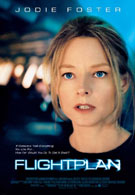Jodie Foster’s output peaked in the nineties, but since then she’s looked content to roll out a big budget thriller every year or two. Her last film, Panic Room, was a claustrophobic thriller in confined spaces, in which motherly instincts take over to help a woman save herself and her daughter. Flightplan revisits pretty much the same themes, but with a little uncertainty thrown in as a twist. Simply put, Jodie Foster might be crazy, and much of the movie is spent playing games of is she or isn’t she as Foster terrifies passengers and harasses stewardesses in mid-air.
Foster, plays a grieving widow named Kyle on a flight to America from Germany with her six-year-old daughter Julia (Marlene Lawston). In the jetliner’s cargo hold is a coffin, and in the coffin is the body of her husband, who died last week under accidental circumstances. Kyle has quit her job as an airline engineer in Germany, and is returning to the United States to spend time mourning with her parents.
Three hours into the transcontinental flight, Kyle and her daughter fall asleep. When she wakes up, Julia has vanished. Kyle walks the plane, Julia isn’t there. Kyle talks to other passengers, the stewardesses, and they don’t remember seeing her. Kyle starts to panic, and demands to see the Captain (Sean Bean), who informs her that her daughter isn’t on the passenger manifest, and that as far as they can tell, she was never on the plane to begin with.
The film is intense and the performances, as you’d expect from this kind of cast are absolutely stellar. At this stage in her life, Foster seems to get motherhood… for whatever that’s worth. She’s convincing as a panic-stricken parent and even more convincing when forced to question her own sanity. Peter Sarsgaard, who plays a concerned Air Marshall, doesn’t exactly inspire confidence in the kind of mid-flight protection our government offers, but does give an interesting take as his character changes with the movie’s shifting plot. He’s so good, that the film might be worth seeing, just for a quick analysis of his quietly confident performance. Sarsgaard continues to be one of Hollywood’s most gifted, unsung talents. At some point, he’s bound to land in a film that’ll get him some much deserved recognition, but Flightplan isn’t it.
The movie’s concept is cool, the execution is taut and filled with suspense, but the resolution (which obviously I can’t talk about) is horribly flawed. Once the movie lays all the puzzle pieces on the table, they frankly don’t fit. Much of what we’re told has been happening is unbelievable, overly complicated, and on even the slightest examination completely unravels. It’s a problem, because no matter how well-built the rest of the movie is, you’ll probably leave the theater feeling a bit under-whelmed. Bad twist endings are common in modern thrillers, but this isn’t so much a bad twist as a poorly thought out resolution. I don’t think Flightplan is trying to shock anyone. The foundation on which the movie is built is unstable, and a good film is left not-quite-as-good.
Robert Schwentke directs Flightplan and Florian Ballhaus is credited with the Cinematography. Schwentke is fairly inexperienced, but Ballhaus has worked on movies like Gangs of New York, Quiz Show, and Men in Black. It shows. He does a wonderful job of framing the film in soothing airline blues and sharp, sometimes reflective colors. The look of the movie has a lot in common with the clean lines and light-reflective colors of Sonnenfeld’s Men In Black. Whatever else it may be, Flightplan looks big-budget slick.
The script ends up somewhat wasted, but the movie is not. Capable direction, great performances, and a slow building mystery overcome jumbo-jet sized plot holes to carry the film. Change up the ending and come up with a better excuse for what’s happening and you’d have an improved movie, but Flightplan gets by well-enough watching Kyle use her aircraft knowledge to annoy passengers and tackle random Arabs with the energetic aplomb.
Your Daily Blend of Entertainment News

